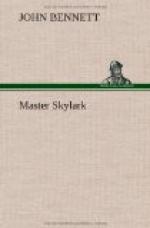The tide ran strong, and the steady oars carried them swiftly down. London passed; then solitary hamlets here and there; then dun fields running to the river’s edge like thirsty deer.
In Deptford Reach some lords who were coming down by water passed them, racing with a little Dutch boat from Deptford to the turn. Their boats had holly-bushes at their prows and holiday garlands along their sides. They were all shouting gaily, and the stream was bright with their scarlet cloaks, Lincoln-green jerkins, and gold embroidery. But they were very badly beaten, at which they laughed, and threw the Dutchmen a handful of silver pennies. Thereupon the Dutchmen stood up in their boat and bowed like jointed ninepins; and the lords, not to be outdone, stood up likewise in their boats and bowed very low in return, with their hands upon their breasts. Then everybody on the river laughed, and the boys gave three cheers for the merry lords and three more for the sturdy Dutchmen. The Dutchmen shouted back, “Goot Yule!” and bowed and bowed until their boat turned round and went stern foremost down the stream, so that they were bowing to the opposite bank, where no one was at all. At this the rest all laughed again till their sides ached, and cheered them twice as much as they had before.
And while they were cheering and waving their caps, the boatmen rested upon their oars and let the boats swing with the tide, which thereabout set strong against the shore, and a trumpeter in the Earl of Arundel’s barge stood up and blew upon a long horn bound with a banner of blue and gold.
Instantly he had blown, another trumpet answered from the south, and when Nick turned, the shore was gay with men in brilliant livery. Beyond was a wood of chestnut-trees as blue and leafless as a grove of spears; and in the plain between the river and the wood stood a great palace of gray stone, with turrets, pinnacles, and battlemented walls, over the topmost tower of which a broad flag, blazoned with golden lions and silver lilies square for square, whipped the winter wind. Amid a group of towers large and small a lofty stack poured out a plume of sea-coal smoke against the milky sky, and on the countless windows in the wall the sunlight flashed with dazzling radiance.
There were people on the battlements, and at the port between two towers where the Queen went in and out the press was so thick that men’s heads looked like the cobbles in the street.
The shore was stayed with piling and with timbers like a wharf, so that a hundred boats might lie there cheek by jowl and scarcely rub their paint. The lords made way, and the children players came ashore through an aisle of uplifted oars. They were met by the yeomen of the guard, tall, brawny fellows clad in red, with golden roses on their breasts and backs, and with them marched up to the postern two and two, Master Gyles the last of all, as haughty as a Spanish don come courting fair Queen Bess.




